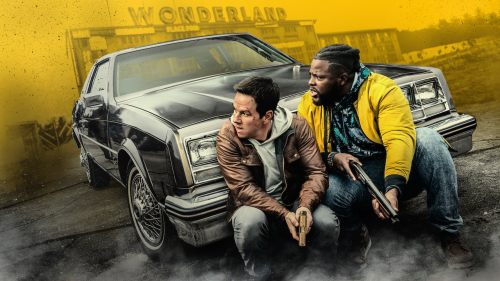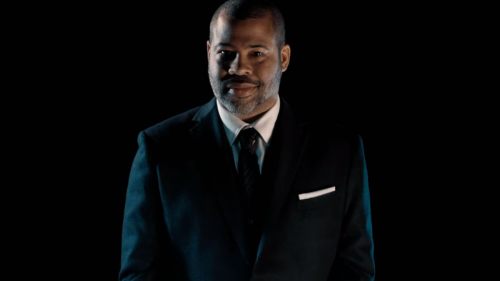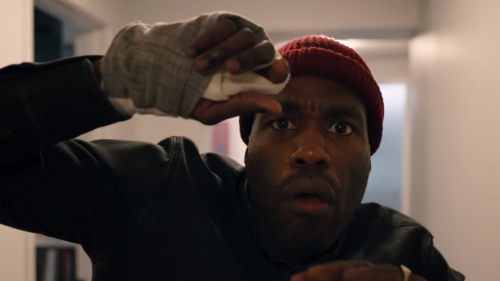Winston Duke Talks US And How Jordan Peele Turns The Familiar Into Something Frightening
Us is in theaters now. Get your tickets here!
Winston Duke is absolutely killing it right now. After playing memorable tribe leader M'Baku in Black Panther, Duke reunites with his Marvel co-star Lupita Nyong'o for Us, Jordan Peele's highly-anticipated follow-up to Get Out. In the fantastic new horror film, Duke plays Gabe, the patriarch of a family that's confronted by their eerie doppelgangers while on vacation. I met up with Duke the day after Us premiered at SXSW, in a loft above a gallery featuring artwork inspired by the film. "Interesting conversations can come from any genre," Duke says. "I just want to continue having interesting conversations in and around my work." What follows is indeed an interesting conversation about a very interesting film.
This may seem like a weird compliment, but your character reminded me of my dad. He's just such a dad.
I think that's one of the qualities I wanted to capture. The All-American dad that felt really familiar – this guy that you feel like you know, but through looking at him closely, you might go, "Is that really me, is that the person I know?" And then you become more objective about viewing them and questioning their behavior and habits, and the normality of it. When I grew up, what was normal for me was seeing fathers on TV – the sitcom dad. I wanted to bring a really big element of the sitcom dad to my performance, but really go deep into, I would say, the privilege he exists in.
I also like the posturing that goes on, not just with the main characters, but with the doubles. That's something universal – who are we really, and who do we pretend to be around other people?
Yeah, and what does real heroism look like? I think it brings that into question throughout the movie because I think some of the elements that are present is that both sides of the story believe that they're the heroes of their own story. And then we get to question which one you actually believe in, either the ones we're familiar with or the shadow – and it's kind of in discussion with that.
This film is really thematically complex and layered. It's the sort of thing where people can walk away with different takes on what it means – what does it mean to you?
For me this movie was about the perils of the American dream and how comfortable it is, yet incredibly insecure – it doesn't actually protect you when you seek a lot of privilege and comfort. And essentially just the worlds that we create as a result of that. All of this looked at through the lens of a family horror thriller, so really interrogating those issues and elements through that context.
And as the head of that family, you have a lot to shoulder – not always so well.
It was really important for me to create a character who, in my opinion, represented extreme comfort. So for me Gabe represents extreme comfort, and that was crippling for him, but the function of him has to be so pervasive that it also makes more apparent what the people in proximity to him are doing – so it makes the wife stronger against such an aloof character, and it makes the children so much more in need of fighting for themselves because they might not be getting good enough direction. You see the limits to his power as the patriarch of this family, and it really begs the question of the limits of the constructs we live in; the limits of patriarchy, the limits of the conventionally functioning family, right? All these different things. Playing a character on such a broad end of the spectrum really helps to illuminate those aspects, so I think that leads into another part of the conversation... for me, that's how I dealt with some of the Jordan Peele-isms, which was, "We have a phone. Now what does the phone represent?" It all connects to so many different layers, and dealing with metaphor and allegory and iconography – how do you deal with that and turn that into actionable things? How do you turn that into specific actions and definitions for the character, you know what I mean?
I do. I admire the way he recontextualizes some of these familiar symbols and ideas in a way that feels very current in our country and what we're going through. Like, there's a line Lupita's character has in reference to the doubles: "They're Americans."
Essentially taking such a familiar statement and turning it into something like that, it makes you question the limit of the construct that is nationality. Like, who is it that are nationals, and who gets to say that and why? Why do we value some rather than all? It begs you to question all of the constructs around you by turning the familiar into the unfamiliar.
I know Jordan Peele is a big horror fan, so were there any horror films he wanted you to watch before or during filming?
There weren't many that we really talked about, but from what we watched, The Shining really appealed to me – which was also a family in distress, trying to figuring their way out of a situation with a monster that looked very familiar but still felt very distant. That's the whole thing – it's not monsters that are outside of ourselves, it's not a werewolf or a vampire, it's ourselves. And I think that's what's really brilliant about this, is that you actually get to explore the spectrum of humanity and how that can manifest differently depending on outside stimuli, depending on where you were raised and who you were raised by. And it really examines our reasons for being.
The Shining is one of my absolute favorites.
Oh, wow! Why?
There's just some heavy stuff in there about abuse and addiction that sort of hits home for me, specifically with Jack Nicholson's role.
It's a total familiar face, but what shouldn't be a familiar behavior.
Like the uncanny – something that looks familiar, but isn't quite right.
Turning the familiar on its head is really, really interesting. I think that's also what you see with the music in Us, like "I Got 5 On It." We're taking the familiar and turning it on its head to essentially paint a new and stark and bewildered picture.
Would you consider yourself a horror movie fan?
No, no, no – I mean, I didn't love horror movies. I saw a couple when I was a kid that just freaked me out. Like Critters, super creepy. Gremlins I thought was really bad, and those Leprechaun movies.
So basically it's the tiny monsters that scare you.
I think so! And I was a kid, so it always felt really immediate. IT, I remember watching and it being about children he was taking, and it always felt really immediate for me, which meant don't go near drains. Stay away from woods. If you have friends that like woods, don't hang out with them and end up food for some crazy clown monster.



